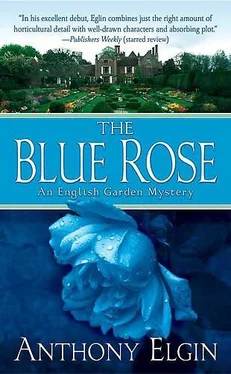Anthony Eglin - The Blue Rose
Здесь есть возможность читать онлайн «Anthony Eglin - The Blue Rose» весь текст электронной книги совершенно бесплатно (целиком полную версию без сокращений). В некоторых случаях можно слушать аудио, скачать через торрент в формате fb2 и присутствует краткое содержание. Жанр: Детектив, на английском языке. Описание произведения, (предисловие) а так же отзывы посетителей доступны на портале библиотеки ЛибКат.
- Название:The Blue Rose
- Автор:
- Жанр:
- Год:неизвестен
- ISBN:нет данных
- Рейтинг книги:3 / 5. Голосов: 1
-
Избранное:Добавить в избранное
- Отзывы:
-
Ваша оценка:
- 60
- 1
- 2
- 3
- 4
- 5
The Blue Rose: краткое содержание, описание и аннотация
Предлагаем к чтению аннотацию, описание, краткое содержание или предисловие (зависит от того, что написал сам автор книги «The Blue Rose»). Если вы не нашли необходимую информацию о книге — напишите в комментариях, мы постараемся отыскать её.
The Blue Rose — читать онлайн бесплатно полную книгу (весь текст) целиком
Ниже представлен текст книги, разбитый по страницам. Система сохранения места последней прочитанной страницы, позволяет с удобством читать онлайн бесплатно книгу «The Blue Rose», без необходимости каждый раз заново искать на чём Вы остановились. Поставьте закладку, и сможете в любой момент перейти на страницу, на которой закончили чтение.
Интервал:
Закладка:
‘Why do you say, “of all places”?’
‘Well, my dear, Bletchley was the place where all the classified code breaking was done during the war. It was all very hush-hush. Just struck me as being too much of a coincidence, that’s all.’
‘I must say, Lawrence, you’re becoming a regular Hercule Poirot.’
‘Ah! Mon ami – nous verrons ce que nous verrons, n’est-ce pas? ’
With her scant knowledge of French, Kate knew roughly what he said and it didn’t escape her notice that Kingston spoke the language like a native.
‘We shall see what we shall see, Kate,’ he added.
He paused momentarily. ‘The actuarial life expectancy tables would indicate that by now – unfortunately for him and us – Farrow is probably six feet under and has been for a few years.’
‘Pushing up daisies, not roses.’
‘Very good, Kate.’
‘You must let us know how you get on tomorrow.’
‘Yes, I will – I hope with encouraging news. Before I go, though, there’s one more thing I wanted to tell you. I took another look at the journals yesterday. I went through them with a fine-tooth comb just to make sure I hadn’t overlooked anything. Do you know what I discovered?’
‘What?’
‘I think we’re missing one book,’ he said.
Chapter Seven
Words fail me to picture dreams of hope, expectations, surprises – yes, disappointment, sometimes despair, that are the lot of the hybridizer…
Dr J. H. Nicolas, rose hybridist
Five thousand miles from Steeple Tarrant in the town of Lakeford, Washington, on the West Coast of the United States, Ira Wolff was finishing his fourth cup of black coffee. It was a quarter to ten on Thursday, 3rd July. The polished mahogany door to his office at Baker-Reynolds was closed. He had instructed his personal assistant to route all calls to his voice mail for the remainder of the morning. Save for a top-of-the-line Hewlett-Packard computer, a white telephone, some neatly stacked folders, a binder, and a tray holding a water carafe and glass, the dark leather desk surface was empty. Clutter was not permissible in Wolff ’s life. He’d called the staff meeting for ten o’clock; he had fifteen uninterrupted minutes to prepare for it.
Were it not for Baker-Reynolds, the small community of Lakeford would have long ago withered like those dusty ghost towns of the West that had prospered only as long as there was gold or silver to be mined. Wolff was majority shareholder, President and Chief Executive Officer of the privately owned corporation. In the case of Lakeford, the ‘gold’ was in the form of another of nature’s gifts – roses. And, barring catastrophe, the roses would survive, as they had for millions of years.
Founded in 1931 as a two-family partnership, B-R – as the townsfolk called it – was among the country’s largest rose growers and hybridizers. Over seven million plants were grown each year at Roseland, the forty-three hundred acre rose farm on the floor of a fertile valley close to the Idaho and Oregon borders. In the planting and harvesting seasons the operation demanded a staff of over twelve hundred. Every year, ten billion gallons of water and five hundred million gallons of fertilizer were pumped into the ground to satisfy the voracious appetite of this thorny colony. Ten months of the year, a highly trained, horticulturally-savvy force of over two dozen sales people fanned out across the US, keeping nurseries and garden centres well stocked and well informed. In the peak selling months, daily sales often climbed as high as a million dollars. Twice a year, professional photographers, commanding fees that would make trial lawyers look charitable, were flown to Lakeford from as far afield as San Francisco and New York. With macro lenses on Nikons and Hasselblads, they would capture the quintessential moments in the life of those prized blooms decreed perfect enough to star in B-R’s catalogues. Over two million copies of these lavish works of art and salesmanship were mailed out, three times a year, to the swelling ranks of rose-crazed gardeners across the nation.
But B-R wasn’t all business. Over the years, it had given much back to the community on which it relied – a notable example being the Lakeford Rose Garden. The three-acre landscaped park was designed to illustrate the evolution of the rose. Starting with ancient species roses, the plantings in the lush park followed the journey of the rose across the globe and through the centuries. Through Asia and China in the years before Christ; thence to the Roman Empire, the Middle Ages and the Crusades; to the celebrated collection at Malmaison, assembled by Napoleon’s wife, the Empress Josephine; and on to the modern roses of the present day. The garden’s more than one hundred thousand visitors each year helped boost, nicely, the local economy.
The Lakeford Clinic and Health Care Services was another of B-R’s community good deeds. A day-care centre, a sport and activities centre for youth, a prenatal clinic, and a number of other charitable works were either fully or partly funded by the county’s number one employer. Since Wolff ’s acquisition of the company, however, no further acts of social conscience were forthcoming.
Baker-Reynolds staff and the townspeople would have been outraged to the point of lynch-mob ferocity had they known exactly how Wolff had managed to gain control of what was considered by economists and financial gurus throughout the US as a model company. Wolff had made certain that the unscrupulous and manipulative pressures he had brought to bear on a certain Baker family board member would never surface. There had been rumours at the time of sale, most related to the confiscatory low price he had paid for the company. There had also been letters and phone calls of protest to the Washington State Attorney General’s office. But the secrets of his threatening to disclose unspeakable sexual improprieties and trumped-up financial duplicity on Baker’s part were as safe and impregnable as a Swiss bank.
The transition – which had received a modest one-column mention on the front page of the Wall Street Journal at the time – had been swift and uneventful. In the years since his takeover Wolff had made it his mission to perpetuate – albeit, sometimes by illusion – the company’s integrity and reputation. Now, as before, to all intents and purposes, Baker-Reynolds was Lakeford. And, provided Wolff continued to conduct the business as his predecessors had, profitably for sixty years, the company and the town would be around for a long time. Roses would always be in demand. Or so it would appear.
Wolff concluded the phone call to his Chief Financial Officer. He took a quick second look over the papers on his desk. Satisfied that he was fully prepared for the meeting, he shuffled them together and placed them in the nearby leather folder. He glanced at his Breitling watch, a gift from the company. It was 9.52, eight minutes before the meeting was due to start. The memo he had circulated three days before, to all B-R corporate officers and department heads, reflected his taste for brevity. It read:
Please plan to attend a special meeting on Thursday, July 3rd, at 10.00 a.m. in the company boardroom.Ira M. WolffPresident and Chief Executive Officer
Wolff sat in the chair, locked his hands behind his head, leaned back and stared vacantly at the ceiling. He’d put a lot of years into Baker-Reynolds. The company had been highly profitable when he acquired it and he had managed to keep it so until recently. Now though, with much fiercer domestic and global competition, he was fighting for his life again. The writing was on the wall: it looked as though nothing could forestall the company’s collapse. Ironically, he’d played it straight this time, operating the company in an aggressive, yet businesslike fashion, never straying from the path of legitimacy. Despite everything he had done to bolster sales and reduce overhead, profits kept slipping inexorably downward and costs continued to spiral. Red ink was seeping insidiously through the pages of each successive monthly profit-and-loss statement. More loans were out of the question. He couldn’t pay those he had. The banks were now getting testy. If the company were to go under, it could be more than just a financial disaster for him. If the State Attorney General or the FBI started to get nosy, or if a cub reporter decided to resurrect the demise of Baker-Reynolds, it would only be a matter of time before Wolff ’s past would start popping up all over the media.
Читать дальшеИнтервал:
Закладка:
Похожие книги на «The Blue Rose»
Представляем Вашему вниманию похожие книги на «The Blue Rose» списком для выбора. Мы отобрали схожую по названию и смыслу литературу в надежде предоставить читателям больше вариантов отыскать новые, интересные, ещё непрочитанные произведения.
Обсуждение, отзывы о книге «The Blue Rose» и просто собственные мнения читателей. Оставьте ваши комментарии, напишите, что Вы думаете о произведении, его смысле или главных героях. Укажите что конкретно понравилось, а что нет, и почему Вы так считаете.












